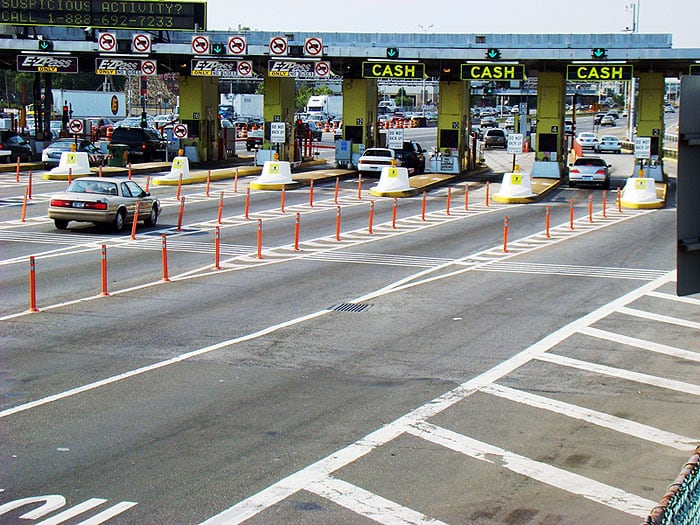I recently attended a presentation by representatives of Move NY that took place before the Brooklyn Community Board 6 transportation committee on March 19. Move NY is an umbrella organization fronted by transportation expert Sam Schwartz that is promoting a plan to toll the East River Bridges.
This iteration of the “congestion pricing” plan first presented in the Bloomberg administration seems to have the cautious consideration of the Mayor and Governor. It is designed to pick up more political support than was the case with the Bloomberg plan. To pick up such support, it has become less a congestion pricing plan, and more of a blatant revenue raising mechanism, albeit with the stated intention of using the proceeds for well-intentioned purposes.
I am always put off by a juggernaut, such as Move NY, that uses slick advertising to label itself as “grassroots” and laces its plan name with fell good words like “fair” and “reinvestment”. If I oppose this plan, does that make me an unfair elitist for disinvestment? I also note that there are many who call for increased funding for such things as libraries, parks, affordable housing and schools but insist that such funding come exclusively out of general revenues. They vehemently oppose public private partnerships that provide such public benefits. By and large they tend to be the same folks who support of this regressive taxation plan for the funding of public transit. I could site numerous examples, but don’t look to embarrass any particular group or person.
Without the changes that I allude to below, I oppose the implementation of this plan. Unfortunately, I don’t believe such changes will be forthcoming. If such changes were made and in the absence of the plausible prospect of a progressive plan to better fund public transportation, I would then supporting such a revised plan.
“User fees” are generally less distasteful then other regressive forms of taxation. Particularly when they are instituted in a measured way, and if they also encourage behavior that has a public benefit. With those caveats user fees are a justifiable way to raise money. In this instance, I accept the premise that the user fee applies to all transportation rather than just to the repair and maintenance of a specific bridge with adjoining roadway that is being tolled. Gas taxes dedicated to road repair and to some degree carbon taxes which account for external costs come to mind as fees that account for costs and provide a societal benefit. User fees also appeal to more conservative elements in society because you can claim that they aren’t a tax at all. However, such regressive tax increases ought to be coupled with tax relief for those with lower incomes. In this plan there is no such relief.
I have not seen a breakdown of how much drivers pay toward the use of roads and straphangers pay for the use of mass transit but there is general agreement that mass transit use has additional societal benefits that would suggest that there need not be an equivalency between the distribution of subsidies for mass transit and road repair .
Unfortunately, the givebacks in this plan are not targeted to people who need tax relief. They are targeted geographically, perhaps cleverly or perhaps cynically, with a view toward gaining additional political support. One of the pitches for this plan is that the current tolling system is an “unfair regressive tolling system.” If this plan succeeds we will replace the current system with a broader, yet still inherently regressive, tolling system that adds to the pain and then spreads it around some more. If fares are to be decreased on a number of bridges and tunnels that are farther from the Central Business District, then such decreases ought to be accompanied by the return of the income based commuter tax. This is preferable to a toll zone along 60th Street.
Since we are seeking “fairness” I asked, at the meeting, if the Staten Island ferry would become part of the metro-card system. It will not. There will still be a free ride for our tourists and those not transferring to trains or buses. Additionally, when you leave the City to go upstate without ever entering the “Central Business District”, you must still pay the additional toll. This is revenue enhancement without a congestion pricing aspect and it would only be exacerbated. If real congestion pricing, in the form of time of day pricing, were to be instituted, this unintended and to my mind negative consequence would only become worse. Perhaps the State could give a tax credit to those who merely pass by the Central Business District. This would have the benefit of making time of day pricing more palatable.
There is a mechanism in this plan to insure that mass transit and highway repair funding levels will be maintained after the plan’s adoption, but it does not go far enough. Most of us would be loath to see an existing or yet another new authority shielding our legislature and executive from their responsibilities. To insure that the plan does what it claims to be doing it must include a sunset provision. This provision would reverse the entire process, in the event that the percentage (not dollar total) of other City and State subsidies to mass transit and roadways drop below pre-plan levels. Additionally, such a plan ought to relieve the MTA or other authorities of any jurisdiction over fare increases, in excess of increases pegged to core inflation. Let our elected officials stand front and center and vote for such increases, if increases should become necessary due to agency profligacy or mismanagement.








